Working from Home in Ireland

In March 2020, a significant proportion of Ireland's workforce was sent home to work remotely.
The COVID-19 crisis catapulted hundreds of thousands of employees and their employers into a work pattern and routine vastly different to their normal daily work experience. This radical change happened suddenly and for the vast majority the change effectively occurred overnight.
While some employees had experience of remote working, many found themselves operating remote working without any time to plan, negotiate, organise and set-up remote working in conjunction with their employer and manager.
Researchers from the Whitaker Institute and the Western Development Commission (WDC) undertook a national survey to gather data on employees’ experiences of remote working during COVID-19.

The survey sought to answer the following questions:
1. How are employees adjusting to remote working, what is going well and what changes would employees suggest?
2. How is remote working impacting employee productivity?
3. What are employees remote working preferences post-COVID-19?
4. What lessons can be learned about remote working that could be retained/sustained post-COVID-19?
Phase 1:
The first phase of researcher, conducted between 27th April and 5th May disclosed the following findings:
83% of participants expressed interest in continuing to work remotely after the COVID-19 crisis.
Over half of those surveyed (51%) had never worked remotely before the Covid-19 pandemic. Of those who had never worked remotely, 78% would like to work remotely for some or all of the time after the crisis is over.
The top three challenges of working remotely included: Not being able to switch off from work; harder to communicate and collaborate with colleagues and co-workers; and poor physical workspace. The top three benefits of working remotely included: no traffic and no commute; reduced costs of going to work and commuting; and greater flexibility as to how to manage the working day.
The challenge of juggling childcare with work commitments was cited as a key issue in the open-ended comments received. The provision of better ergonomic equipment is one of the key changes suggested by employees to help with their well-being and productivity while working remotely. Many also report the need for more suitable workspace within their home and just under 1-in-5 (19%) identified internet connectivity as an issue.
“The findings of our survey indicate that employee preferences to continue working remotely will facilitate the opening up phase and aid with social distancing. The future of work post-COVID-19 is really interesting. The vast majority of respondents want to continue to work remotely when the crisis is over. Many roles and jobs can be performed effectively remotely. What is the benefit of long commutes to work and sitting in traffic if we can leverage technology at least some of the week to do our work? Productivity does not necessarily correlate with presence in the workplace. What we do is more important than where we do it for many roles. A mind-set change is needed by managers and employers in terms of managing work remotely. The current crisis provides an opportunity for organisations and managers to rethink how we work.”

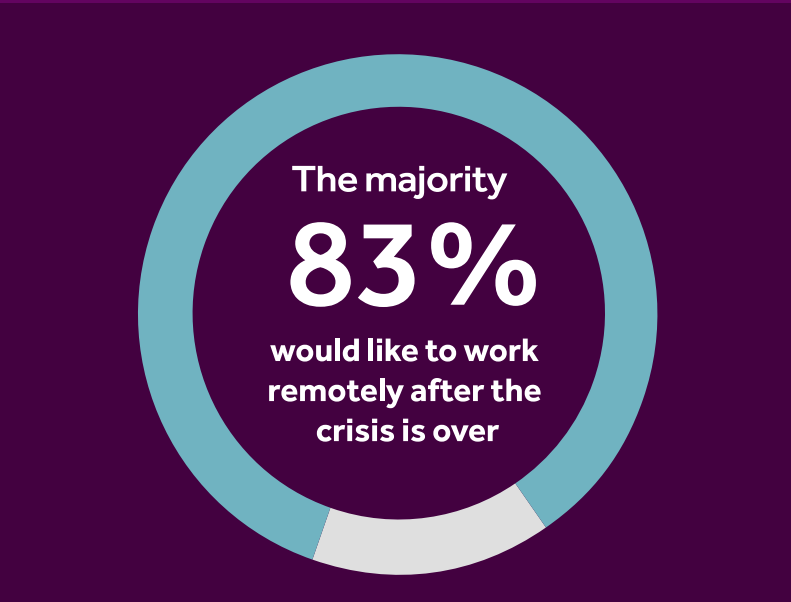
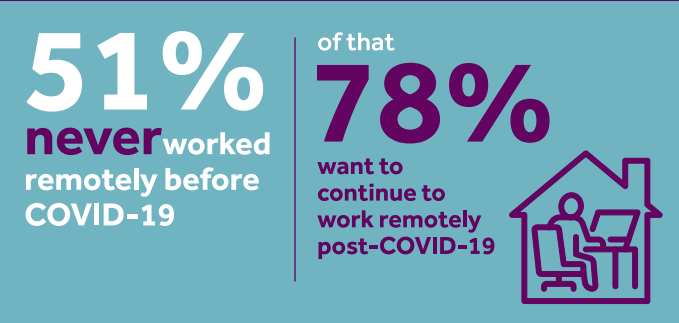
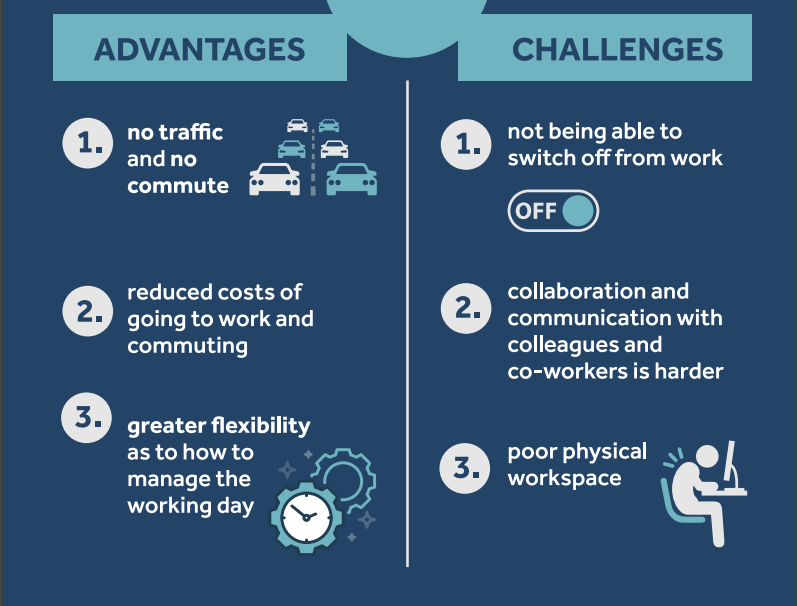

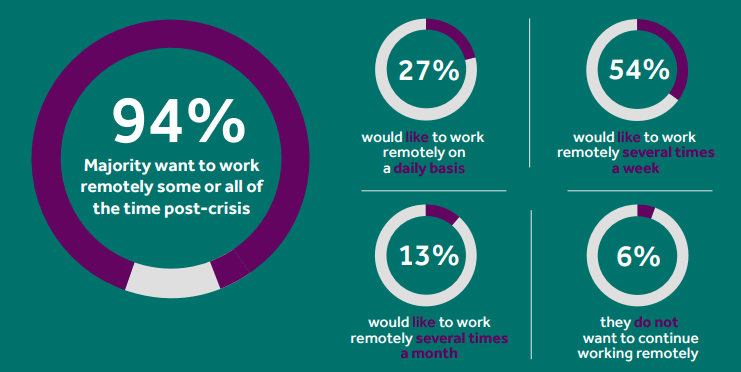
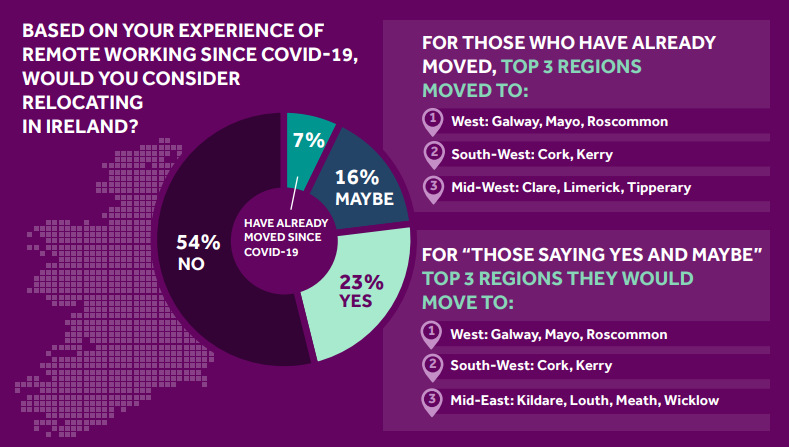


Phase 2:
The Second Phase of the Working from Home Survey found that:
94% were in favour of working remotely on an on-going basis for some or all of the time. The majority of those, 54%, said they would like to work remotely several times a week, 27% said five days a week, and 13% said several times a month.
23% of respondents said they would consider relocating within Ireland based on their experience of remote working since COVID-19. A further 7% said they had already moved and the West (Galway, Mayo, Roscommon), the South-west (Cork and Kerry) and the Mid-West (Clare, Limerick, Tipperary) were the top regions respondents have relocated to. 16% said they may consider moving, while just over half (54%) said they would not consider relocating.
In the context of work/life balance, 36% of respondents said that they did not respond to emails outside of working hours.
“The second University of Galway/Western Development Commission national remote working survey has, once again, gained huge interest with over 5,600 responses. There is a resounding demand from employees to continue to work remotely post-crisis. The remote working experience presents a game-changer for how many organisations will manage their workforce into the future. For those who can work remotely, they seem to have settled into it quite effectively six months on from lockdown.”
How have people's attitudes changed since the start of the pandemic?
The overwhelming majority (94%) is a significant increase from the 83% who wanted to work remotely in the April survey. Conversely, only 6% indicated in the second phase that they did not wish to work remotely to any extent – a drop from 16% who gave that response in April. The number of respondents working fully remotely fell from 87% in April to 68% in the first week of October as there was more of a mix of onsite and remote in the latest survey.
Loneliness and isolation, staying motivated and difficulties with the physical workspace were identified as the main challenges to working remotely. These challenges had changed since April, when not being able to switch off from work, collaborating and communicating with colleagues and poor physical workspace were the main challenges identified.
There was no change to the top three benefits of working remotely; identified as no traffic and no commute, greater flexibility in how to manage the working day and reduced costs of going to work and commuting.

Prof Alma McCarthy
Professor Alma McCarthy (Cert. Executive Coaching, Dip. Training & Education, BBS & French, MCIPD, PhD) is Head of the J.E. Cairnes School of Business & Economics and Professor of Public Sector Management at University ofGalway. Her research interests include public sector leadership and human resource development, training, work-life balance, and 360º feedback.
Her research has influenced national civil service talent development policy and the Government's national remote working strategy. She is a Chartered Member of the CIPD, the American Academy of Management, the Society for Industrial and Organisational Psychology, and served as elected Vice-Chair and Chair of the Irish Academy of Management. She is an accredited member of the British Psychological Society (BPS) and certified to administer a broad range of cognitive ability, personality and occupational interest psychometric assessments.
